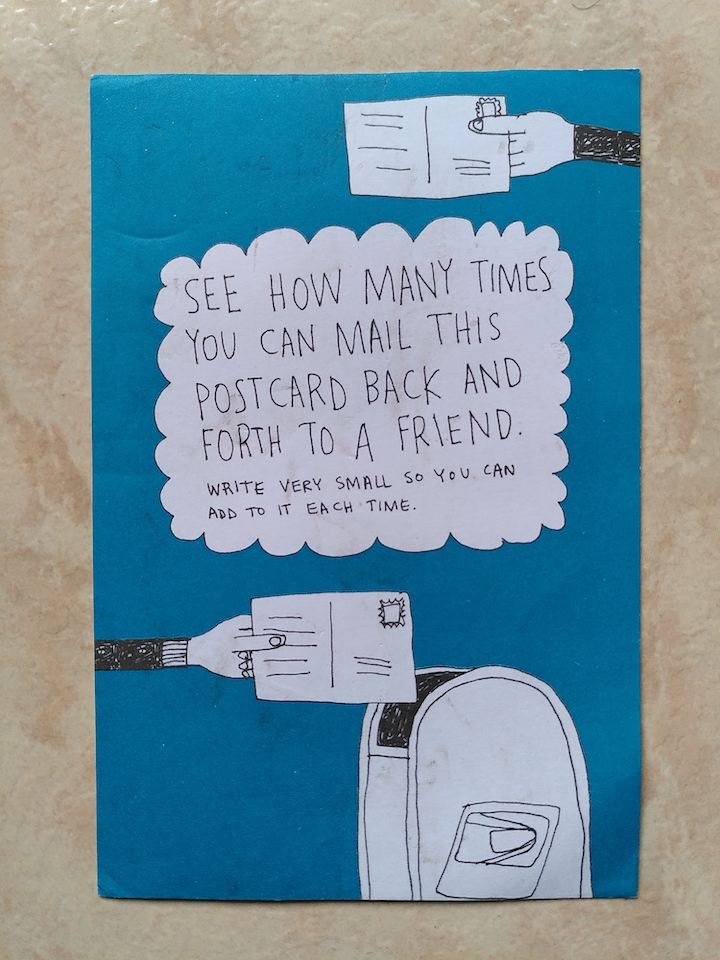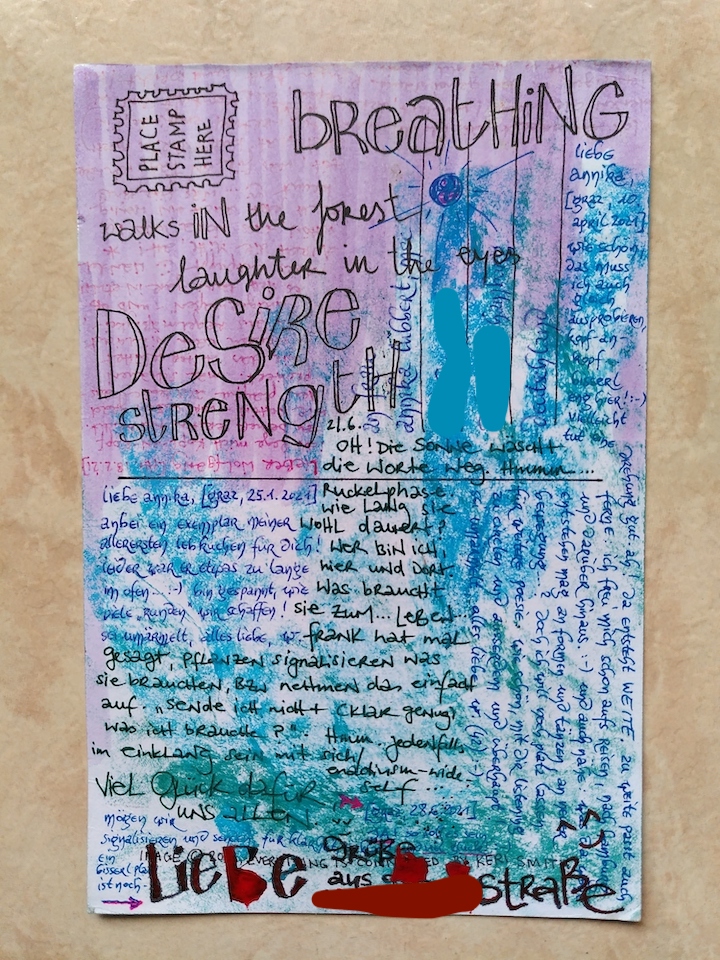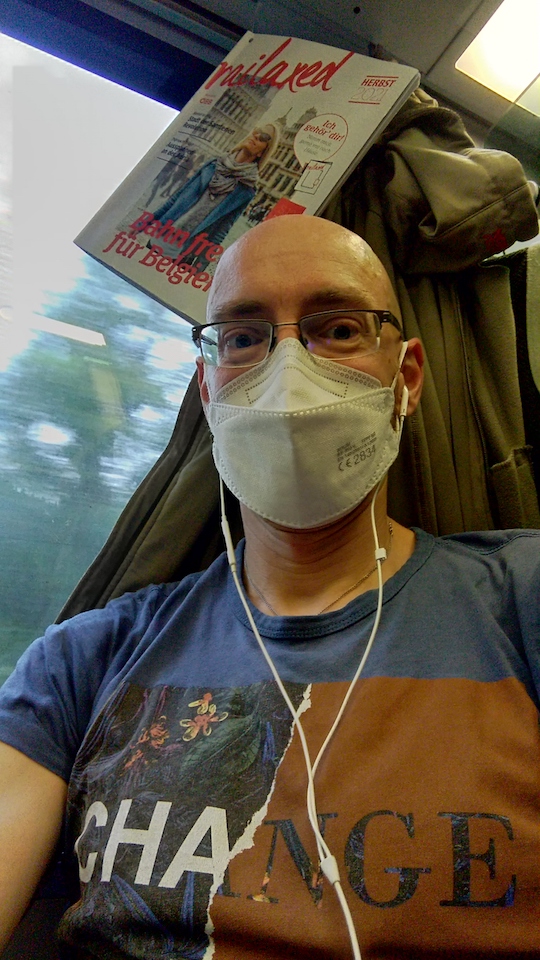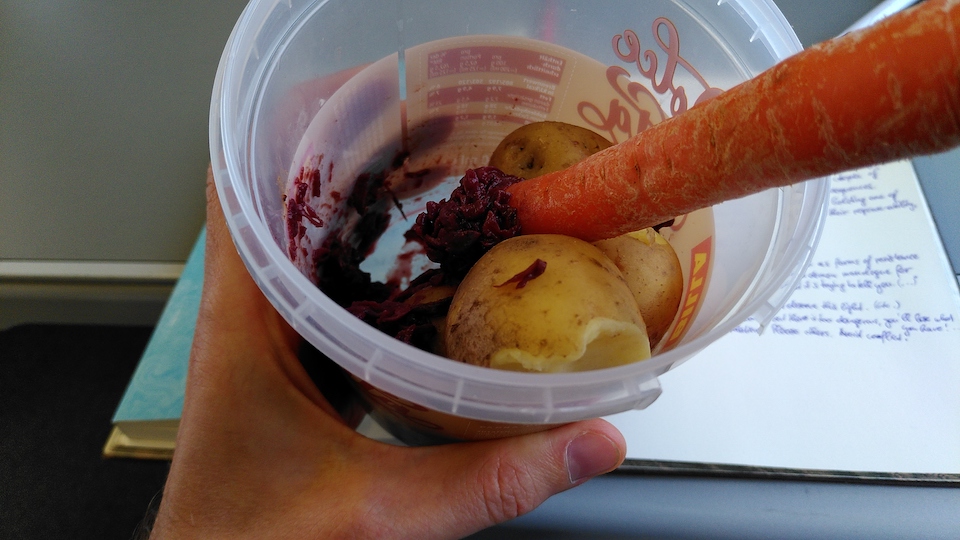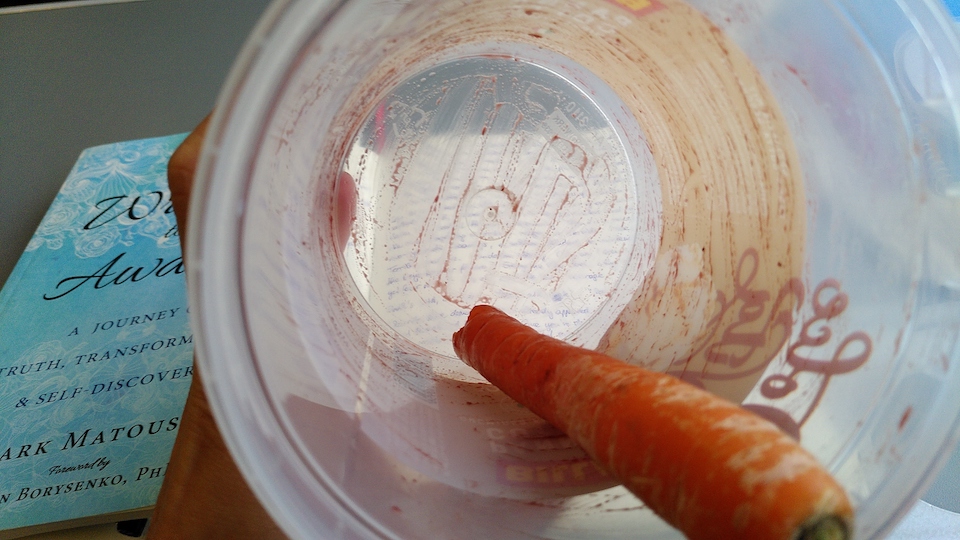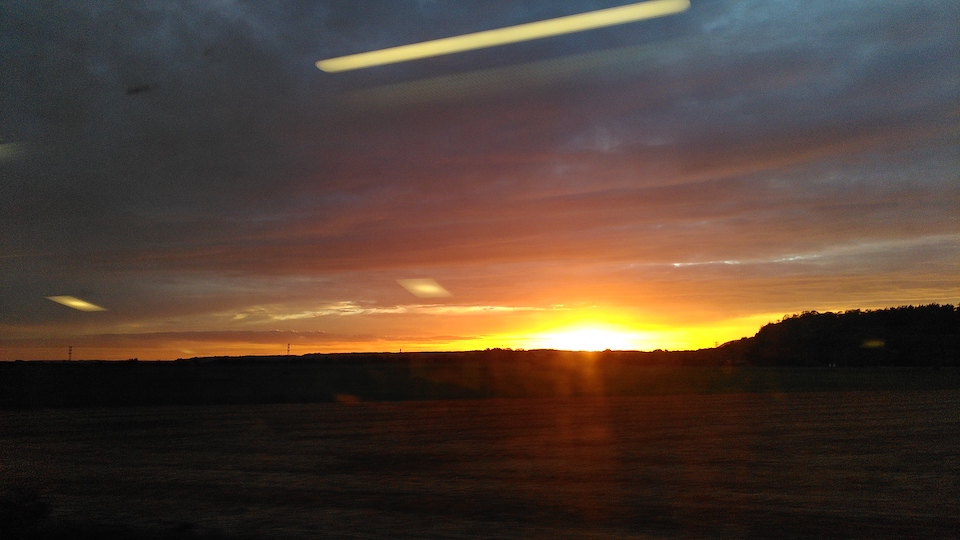Wednesday, 6th October 2021
This travel diary is a sort of continuation of my previous diary from June 2021, but also tells its own story. I’ll use present tense right away. The ‘outer purpose’ of this journey is a trip to Berlin for the Emerge Gathering 2021, with extra days to meet my friends J and W, followed by a couple of days in Hamburg to co-create with Annika for & around the Mindful Researchers initiative and to spend deep time in Nature. As for the ‘inner purpose’ … we’ll get to that later.
As for the pictures, just click to enlarge!
Yesterday, in preparation for this journey, I fetch a presumably larger backpack from my brother, then rush to a Mindful Researchers meeting, then rush to the Royal English Cinema (now called “KIZ Royal”) where my friend Klaus awaits me with a huge bag of fresh popcorn. Klaus and I first met in September 1997 as neighbors in a queue, awaiting our turns to become registered as freshman students at Graz University of Technology. Being of highly compatible geekiness, nerdiness, and sense of humor, we quickly became friends. About 24 years later we are in a queue again – this time awaiting our turns to get tickets for the new “Dune” movie. We enjoy the impressive blockbuster and are caught by surprise when it ends abruptly in the middle of the story (oh, it comes in two parts!). For me this is enough of a teaser to listen anew into the amazing Dune audiobook (narrated by Simon Vance and others) upon returning home.
Arrakis. Dune. Desert planet.
This morning I open an envelope from Annika. We’ve been sending a postcard back and forth for about six times, always adding a little bit, sometimes including gingerbread or feathers. I’m showing the result here with Annika’s permission; too bad we have already run out of space, although we might just add further layers to it and give future archaeologists something to puzzle over!
This time I choose not to pack ALL THE THINGS, yet I still cannot resist preparing a more than generous pile of favourite T-shirts. The new backpack turns out to be not quite as large as I thought, calling for radical reduction. No second pair of shoes, no second hoodie, no second towel. Travel lightly. Pack food. Do the dishes. (Damn those dishes!) Run out of time. Get yourself onto the bike. Ride to the train station. Lock the bike. Hop onto the train three minutes before departure. Find your reserved seat. Sit back and enjoy the 11 hours and 40 minutes ride.
Arrakis. Dune. Desert planet.
My recently finished (audio-)books since my 42nd birthday are, in reverse order:
- adrienne maree brown – “Emergent Strategy”
- Gigi Coyle – “Kaleidoscope: Finding my way around”
- Richard Powers – “The Overstory”
- Jeremy Lent – “The Web of Meaning”
- Jeremy Lent – “The Patterning Instinct”
- Robin Wall Kimmerer – “Braiding Sweetgrass”
- Darlene Lancer – “Conquering Shame and Codependency”
- Hermann Hesse – “The Glass Bead Game”
- Michael Nußbaumer – “Weltübergang”
- Robert Wright – “Why Buddhism Is True”
- Pete Walker – “Complex PTSD: From Surviving to Thriving”
I am also halfway through Hanzi Freinacht’s “The Listening Society” in preparation of the Emerge Gathering 2021. Now listening to Frank Herbert’s “Dune” gives things a slightly different twist and evokes rather peculiar trains of thought – or rather, a rapid succession of gestalts that I cannot quite translate into words:
I'm on the train to Berlin. Yesterday night I watched "Dune" with Klaus. (...) I recall that the audiobook also gripped me. It is fiction, yet also resembling facets of our reality ... and I understood something about rivalrous dynamics, technological advances that can be exploited for dominance, and scarcity of vital resources. Power. Empowerment. Creation. Control. Shadow and light. Prophecy. Narrative. Myth. I understood in some sense; I 'see' the field, yet concrete extractions of conclusions remain elusive. I also understand, or choose to understand, all of this in the light of enaction. We enact these worlds, also the technological world. The 'war on sensemaking' is a competiton for frames of enaction. Cognitive frames. Can AI and simulations offer coherent extrapolations of our futures? Oh, but whosoever controls the AI, whosoever feeds it with key parameters and basic foundational laws, may control the fates of humanity! Then it is a race for sensemaking, for the most compelling narrative – religion on steroids. I see a dark utopia of neo-cybernetic weavings, a sublime blindness to unintended consequences. (...) We all need the same courage. – Journal entry on Wednesday, 6th October 2021
These words represent some of the most salient bits and pieces of translation of a quite fast-paced embodied cognitive process – a non-verbal ‘stream of consciousness’ – that matches, mingles, and remixes the arising gestalts, from most basic to most complex. This process feels somewhat like multi-sensory ‘images’ blending into each other, sometimes slow & smooth and sometimes more like a stroboscope, offering new meaning to the observer in every moment. And it feels like it’s unfolding in several ‘planes’, not just the rational-cognitive plane. I have no certainty for what that really means. I just know it is nothing to be troubled about, although it sometimes brings me to my knees when I allow it to have its way with me …
Upon crossing the border to the Czech Republic (yet unrelated to the geographic fact), I am faced with the challenge to find a workaround to replace the forgotten fork. I do have a carrot. I do have teeth. What are our teeth for? Bingo! Gnawing a carrot-fork into existence dramatically boosts the ability to enjoy the prepared food (delicious red cabbage cooked with hemmelige ingredienser and chestnuts, plus boiled potatoes).
The beet soup challenge is a lot trickier – this carrot is clearly too slim for me to gnaw a proper carrot-spoon. I drink the soup sans veggies, then apply the carrot-fork to push and pull the veggies; surely crows would have done a more elegant job with twigs and beaks. Anyway, yum! The best part comes last: praise be upon the edible carrot-fork.
We’re picking up 15 minutes delay. An Ouroboros 2021 session with Claire Petitmengin pulls my attention. Annika is among the live participants, and I wonder if she is again taking her signature “colorful notes” – like a graphic recording, but more organic if you ask me – meriting a badge of honour: Annika the artist-researcher. The session title, “The Gesture of Awareness – an account of its structural dynamics”, promises a fascinating conversation. At this point, I don’t know yet how deeply it will influence the rest of my journey. In the following I share some written notes:
What prevents us from being aware? (What a fascinating question!) - Phenomenology: the 'natural attitude', - Elicitation Interview: the pre-reflective nature of experience?, - Buddhism: avidyā (Sanskrit) / avijjā (Pāli) = ignorance. How can we learn to become aware of what eludes us? "How can I aim for something that I don't know that I know, while I don't know that I don't know it?" Thre are gestures of becoming aware, gestures that prevent one from becoming aware, and skillful triggers for the gestures of becoming aware: these can be ... (1) triggered by external or existential events, (2) learned by self-imposed discipline (e.g. meditation training), (3) induced by a therapist, meditation teacher, or interviewer. A key step is the 'conversion' (or redirection?) of attention from the 'exterior' to the 'interior' world, from "what" to "how" (asking how it emerges) – imposing a temporarily enhanced duality. A subsequent key step is 'letting go': essentially a shifting from 'looking for' to 'letting come' (which erases the previously enhanced duality of interior/exterior!). This gesture is followed by a 'gap' moment of silence or stillness (note: like a 'delayed reaction' in General Semantics?). Skillful practices to release a subject's the tension towards the object, in order to loosen the subject-object duality: do not sustain the phenomenon under investigation, leave it "without support". Thus the tension unravels and subtilizes by itself. A question: "How does a generic experiential structure emerge?" (and what 'is' this structure?) A comment in the livestream chat: "First rule of the époché: you do not talk about époché". :-)
It becomes readily apparent in the session how difficult it is for us to speak about these fundamentally experiential aspects of experience itself, as if trying to “eff the ineffable”. Even so, ain’t that a wonderful companion to the surgically precise metacognitive and perceptual observations of Paul Atreides and Lady Jessica in “Dune”?
Arrakis. Dune. Desert planet.
By the way, here’s an interesting link: Frank Herbert, the author of the “Dune” books, was influenced by the “trans-disciplinary meta-discipline” of General Semantics. When I asked Claire Petitmengin after a Mind & Life conference in Boston in 2014, she confirmed (if I remember correctly) that she too had been inspired by General Semantics some decades ago; though when sharing it with her supervisor and mentor Francisco Varela at the time, he had remained rather unimpressed by it. I wonder if this had something to do with the oftentimes ‘hyper-intellectual’ presentation of General Semantics, pushing what is actually supposed to be a practical discipline into the realm of our intellects and thereby tempting us to neglect the actual practice. This is a common pattern that I know too well from personal experience, and we will soon encounter it again along this journey.
I still wonder if General Semantics holds potential for academia in general and for contemplative research in particular. From 2014 to 2016, I shared several conference presentations and posters on the similarities (and differences) between Neurophenomenology, Buddhism and General Semantics in theory-and-practice. Then I dropped the subject as my focus shifted to the topic of collaboration and the Contemplative Scientific Collaboration project. Might there be a time to revive these old ideas, now that more people have seemingly independently been putting the spotlight of their curiosity onto connections between Buddhism and General Semantics? And might there be a unique contribution to these connections, yet to be explored further, via Neurophenomenology and the ‘enactive view’?
Back to the journey. Night has fallen as we are crossing the border to Germany. I attend parts of a “New Republic of the Heart” (NRotH) community session. This is a quite ‘radical’ – yet profoundly peaceful – social experiment, initiated by Terry Patten. I’ve been dipping my toes into this community since last Summer, around the time when I stepped out of Leap Forward after four intense years. I’ve limited my engagement in the NRotH to a weekly dyad call with another Wolfgang who has since become a dear friend. And occasionally I’m checking into these community calls.
I begin to see a pattern of engaging with social experiments and (intentional) communities. The origins are for me perhaps to be found way back in 1997 with KaraNet. More recently I’ve been engaging very intensely with Leap Forward, rather softly with the New Republic of the Heart, and again intensely (yet quite differently) with the Mindful Researchers. Of these three, the Mindful Researchers community really feels like ‘my heart-child’, a garden that has been growing many gardeners. On this journey I’ll meet people from two of these three communities.
Finally we reach Berlin main station and I take the M5 to Strausberger Platz. What a relief to take off the FFP2 mask and inhale deeply, even if it is the fragrance of streets! Yet walking the dimly lit roads of Berlin at night makes me feel a bit like an alien. What am I doing here, again?
Arriving at the “Singer 109” hostel, doning my mask again, checking in, climbing the stairs to the second floor, coming across legions of youngsters. Entering a simple but stylish room with 2×2 bunk beds, one of each is occupied by Mikkel from Denmark and myself. Shower. Sleep. Dreams.
Intense dreams.
Bizarre dreams.
Sweet dreams.

